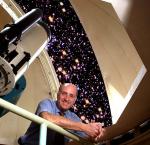UBC 1970-date,
Uppsala (Sweden) 1977, CFHT (Hawaii) 1984, Cambridge (UK) 1991, Rome Observatory (Italy) 1998, UCLA (California) 2005, STScI (Baltimore) 2010
Fellow Royal Society Canada 2014,
Carlyle S. Beals Award (CASCA) 2014,
Distinguished Peter Wall University Professor 2010,
Canada-US Fulbright Fellowship 2005,
Canada Council for the Arts Killam Fellowship 2001-03,
Gemini Scientist for Canada 2000-03,
UBC Killam 1991
Department: Associate Head for Faculty Development,
Community: CFHT Board of Directors 2006-2013, Chair 2008-2009
BirthPlace: Montreal
My area of research is stellar astronomy and I am interested in what resolved systems of stars can tell us about dark matter, the age of the oldest stars, the dynamical evolution of stellar systems, fundamental physics and the formation of galaxies. To investigate these diverse subjects I observe a wide range of objects including nearby stars, open and globular star clusters and the resolved components of our neighbouring galaxies. To accomplish my research goals I use a variety of telescopes particularly the twin Gemini Telescopes, the Canada France Hawaii Telescope and the Hubble Space Telescope. An intensive area of current interest is a search for the oldest white dwarfs. In the right environments, extremely cool white dwarfs can be used to check on the chronology of stellar systems and provide age estimates largely independent of the usual assumptions of stellar evolution theory. Ages of stellar systems using white dwarfs are currently being derived for open clusters, the Galactic halo and globular star clusters. The eventual aim is that these ages will confront ages derived from stellar evolution and from the expansion of the Universe and lead to new insights into cosmology.
